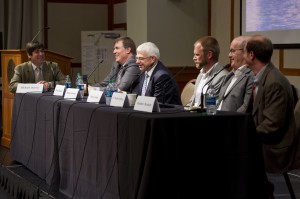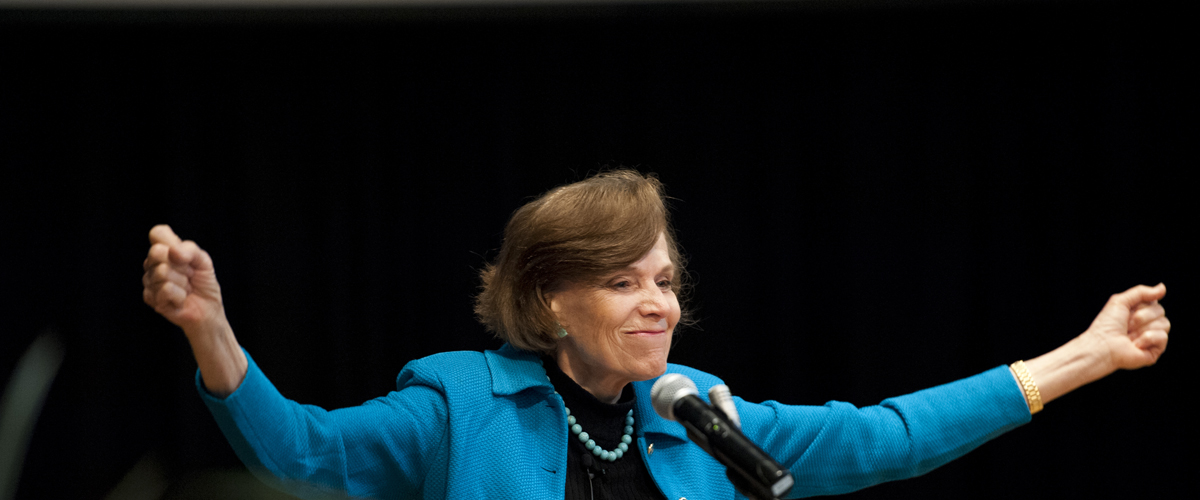by Angela Herring
In 1967, the year Northeastern’s Marine Science Center was established, the world was a different place. There were four billion fewer people then, and the global temperature was nearly one degree cooler. Industrial fishing practices were still relatively new, and concrete seawalls were sprouting up along coastlines around the globe. New England’s cod fishery and the world’s coral reefs were both still thriving, and the human communities and economies that relied on those species were too.
Nearly a half-century later, it’s been shown that vertical seawalls are damaging the very coasts they were intended to protect and industrial fishing practices threaten many of the world’s fisheries.
EXTRA: WATCH CONFERENCE LECTURES AND PANEL DISCUSSIONS
At a kickoff event last Wednesday night to the inaugural Sustaining Coastal Cities conference held at Northeastern, world-renowned oceanographer Sylvia Earle said “we are living in the sweet spot.” With today’s science and technology, we are beginning to understand how our past has impacted our present, and how we can use that information to steer ourselves toward a more sustainable future, she said.

From left, led by moderator and National Public Radio journalist Richard Harris, panelists included Brian Helmuth, professor and director of the Sustainability Science and Policy Initiative at Northeastern University, Stephen Hawkins, professor of Natural Sciences at the University of Southampton, England, Daniel Adams, assistant professor in the School of Architecture at Northeastern University, Ove Hoegh-Guldberg, director of the Global Change Institute at the University of Queensland in Brisbane, Australia, and Matthew Bracken, professor of marine and environmental sciences at Northeastern University.
The daylong conference last Thursday welcomed nearly 200 guests from around the world into Curry Student Center Ballroom, where Marine Science Center faculty and their colleagues from leading national and international marine institutes began a new conversation about the past, present, and future of marine systems and our place within them.
Located 25 minutes outside of Boston, Northeastern’s Marine Science center offers faculty and students a unique opportunity to study immediate human impacts on the urban coastal system. Marine science researchers are building global collaborations and conducting groundbreaking research in areas like underwater robotics and the effects of climate change on the globe’s coastlines.
“A sustainable marine system doesn’t just have more fish, but also a healthy human community and economy,” said Larry Crowder, the director of Stanford University’s Center for Ocean Solutions. He emphasized the need to consider the social-ecological system as fully coupled between humans and marine species.
The demand for fish as food, which supplies 20 percent of the world’s protein, will only skyrocket as our population continues to grow, said Steven Gaines, dean of the Bren School of Environmental Science and Management at the University of California Santa Barbara. As such, sustainable—if large scale—fishing practices are becoming ever more critical.
But the motivation to be sustainable is still overshadowed by a short-sighted economy, said Dan Adams, assistant professor of architecture at Northeastern. “The economic stream is all about consumption,” he said. “How do we change it to an economy of conservation and preservation?”
Fish are important way beyond the protein their bodies provide, said Ove Hoegh-Guldberg, director of the Global Change Institute and professor of marine science at the University of Queensland. They are an integral part of a complex ocean system, which produces 50 percent of our oxygen and absorbs 30 percent of our excess carbon dioxide and 95 percent of our excess heat. Threats to fish populations equal threats to the oceans, and threats to the oceans mean bigger global environmental challenges for our children and grandchildren.
While the outlook seems grim, Steven Hawkins, dean and professor at the University of Southampton, said “small interventions can make a huge difference. It doesn’t take much to reestablish a failing oyster community: All you need is the right design and the right frame of mind.”
Geoff Trussell, director of the Marine Science Center and the visionary behind the first-of-its-kind conference, said Northeastern is “bringing people to campus who are interested in walking the walk rather than just talking the talk.” With the Urban Coastal Sustainability Initiative, Trussell and his colleagues are building an interdisciplinary program aimed at taking the discussion into the communities that are directly affected by the issues at hand.
“Our destiny is intertwined with the oceans,” said Hoegh-Guldberg. “If they go down, we go down as well.”
Trussell hopes the conversation started on Thursday will help prevent that from happening.

